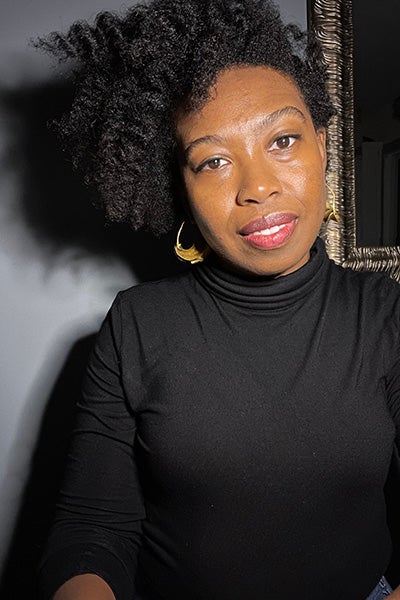Harriot College announces Whichard Distinguished Professor in the Humanities
East Carolina University’s Thomas Harriot College of Arts and Sciences has announced that Dr. Aleia M. Brown is the college’s David Julian and Virginia Suther Whichard Distinguished Professor in the Humanities.
The professorship was established in the mid-1990s by the generosity of family members of the late David Julian Whichard, a 60-year editor and publisher of Greenville’s The Daily Reflector, and his wife, Virginia Suther Whichard, a former teacher and 1917 graduate of what was then East Carolina Teachers Training School.

Dr. Aleia M. Brown is joining the East Carolina University Thomas Harriot College of Arts and Sciences as the college’s Whichard Distinguished Professor in the Humanities. (Contributed photo)
Brown comes to ECU after serving as the vice president of programs and chief curator at the National Women’s History Museum, where her main responsibility involved developing exhibits and strategies for interpreting women’s history in the United States. She will hold the Whichard professorship from 2022-25 in Harriot College’s Department of History.
“I am thrilled and honored to work as the Whichard professor at ECU,” Brown said. “Colleagues in history, and the African and African American studies and gender studies programs have already been encouraging and supportive.”
“Location is important to me, too. The eastern part of the state is home to significant points in the Black radical tradition. I am grateful to be working in a region where so many people have struggled for labor rights, environmental justice and more. Developing projects with, for and alongside these folks is inspiring,” she said.
ECU and the broader community will benefit from Brown’s research and teaching expertise. She is an interdisciplinary scholar with a proficiency in 20th century African American history; Black women’s history, museums, memory and material culture; and Black digital humanities.
“In the broadest sense, my vocation and life work are thinking through all of the ways Black women have experimented with different configurations of freedom,” Brown said. “My current research, ‘Disrupting the Loop of Recovery: Black Women’s Engagement with Textile Art and Political Thought,’ evinces the solidarity economy that developed alongside collaborative aesthetics in the 1960s Alabama Black Belt and Mississippi Delta regions.”
Brown’s project includes an accompanying virtual reality gallery that considers what it means to curate digital environments from a perspective of Black feminist love. She veers away from sensationalizing violence in Black past, present and future.
In her public history practice, Brown prioritizes collaborating with Black communities and organizations.
“Connecting with local and national networks calls for an ethic of care — a process that is sometimes circuitous and does not always align with academic calendars. But we birth transformative projects when we carefully nurture shared investments in Black life over time,” Brown said.
One project Brown said she is most excited to work on during her professorship is organizing Third Space, a research collective committed to Black study within and outside the university.
“We will organize exhibitions, public talks and working groups that resonate with both local and national audiences,” she said. “We will also document our experience creating a Third Space, or a space that is self-organized based on our own metrics.”
Brown is eager to work with the Women of Color Quilters Network.
“In addition to pushing the boundaries of how we understand the history, aesthetic and function of quilts, they have produced exhibitions of striking proportions that facilitate a recall of a hidden history for some and a total disruption for others. We are going to co-organize an exhibition and convene artists working in Black textile traditions to define different aspects of their work’s legacy,” she said.
In addition to her research and special projects, this fall Brown is teaching Black women’s history and reconstruction to the present. She also plans to teach introduction to Black digital humanities, hoping to plant the seeds for work that may be continued beyond her time as the Whichard professor.
Before coming to ECU, Brown held positions in both academia and in public history organizations. She was the assistant director of the African American history, culture and digital humanities initiative at the Maryland Institute for Technology and the Humanities, and an affiliate faculty of American studies at the University of Maryland, College Park. In addition, she held the Mellon-ACLS public fellowship at the Humanities Action Lab at Rutgers University-Newark, and she was the curator of African American history at the Michigan State University Museum.
“The through line in all of this work is using both digital and physical mediums to remind us of histories that are actively obscured through subjugation,” Brown said. “While I have worked in these institutions, my scholarship is also about how Black scholars and scholars of Black history can only approach these spaces with impossible questions. I am part of a tradition of Black women historians who know the limitations in studying Black life through institutional means. I am also part of a tradition of Black public history practitioners, artists and activists who have created their own autonomous spaces to answer the questions that are impossible to answer elsewhere.”
ECU is in the public phase of the Pursue Gold campaign to raise half a billion dollars. This ambitious effort will create new paths to success for Pirates on campus, across the country and around the world. Donor gifts during the campaign will keep us constantly leading and ready to advance what’s possible. Learn more at pursuegold.ecu.edu.